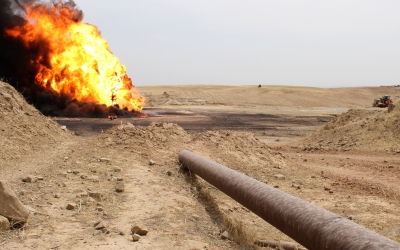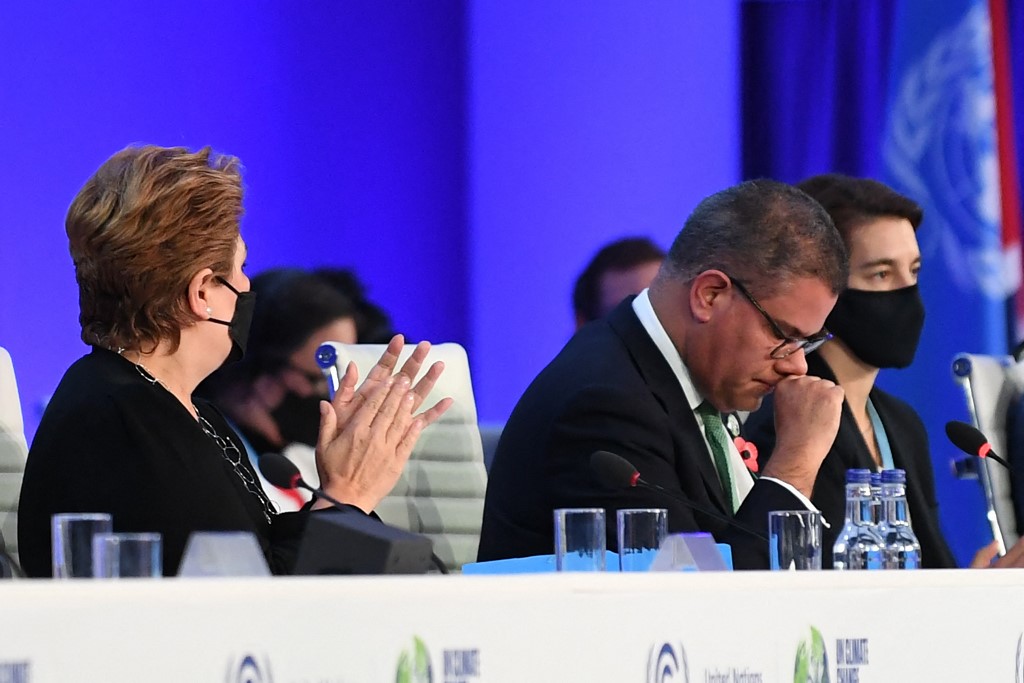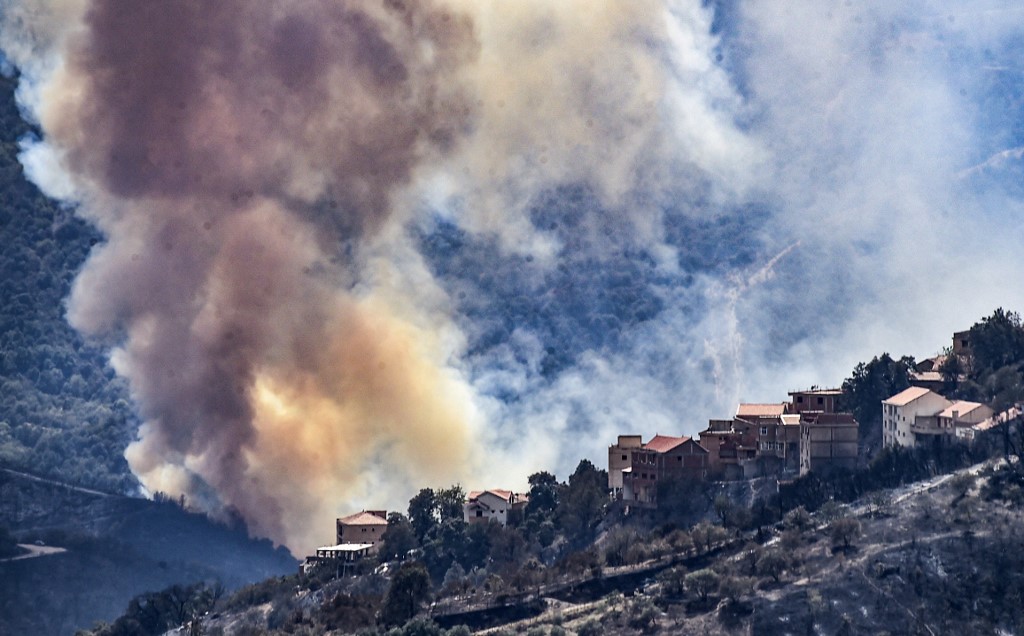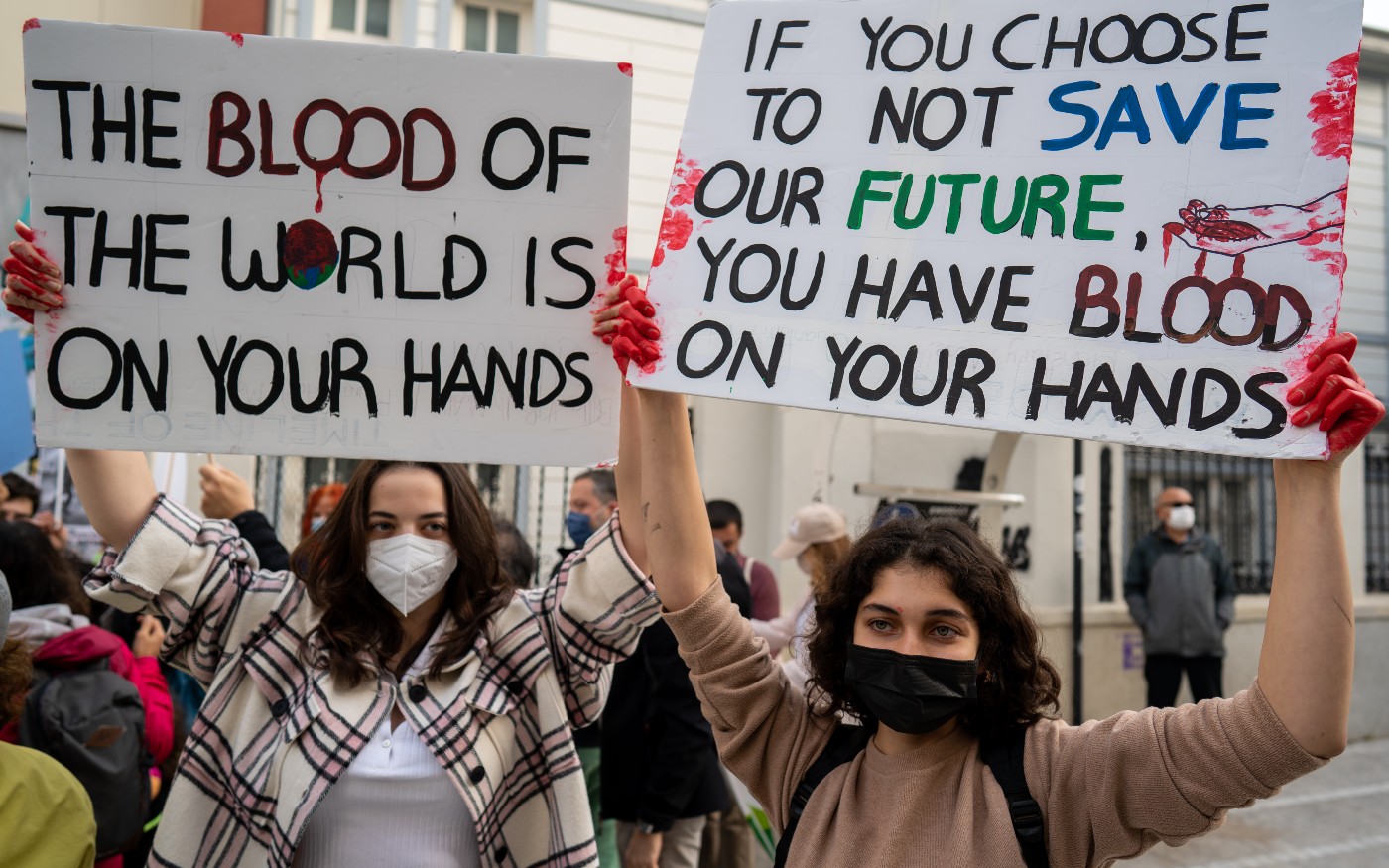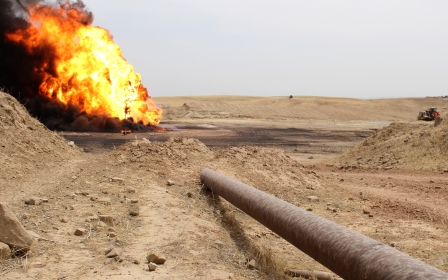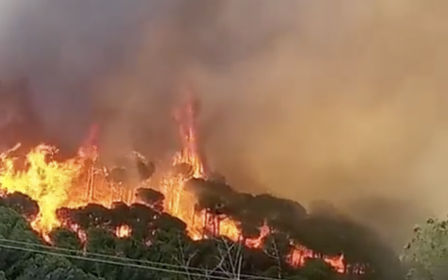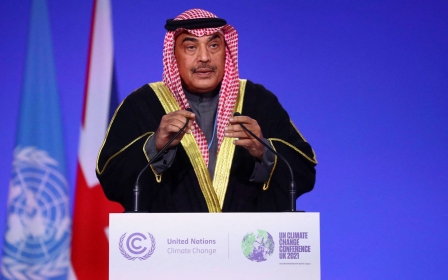COP26: Middle East climate activists slam deal as 'epic' greenwashing failure
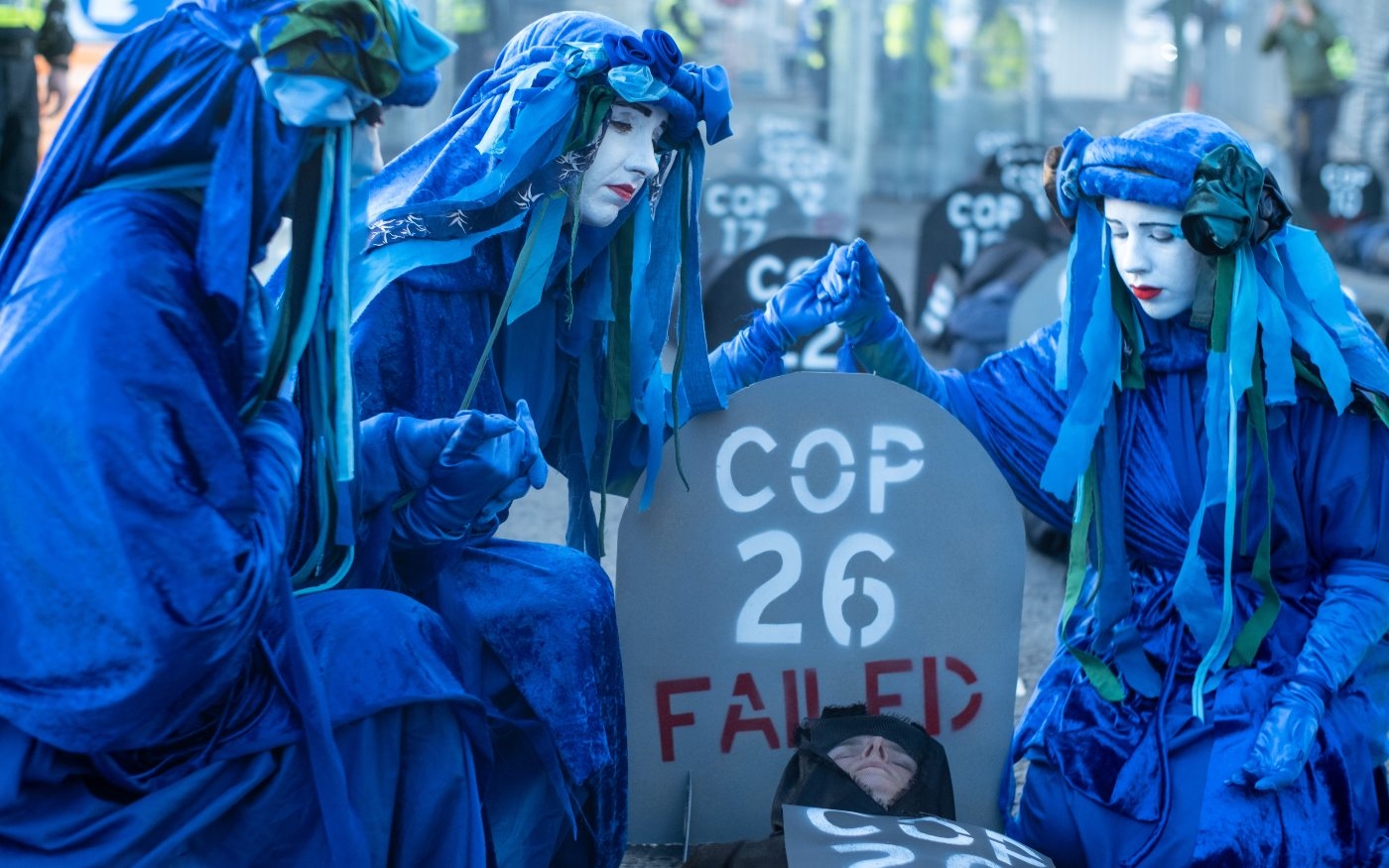
Hamza Hamouchene wasn't expecting much when he arrived in Glasgow at the beginning of the COP26 summit.
Even so, as the United Nations Climate Change Conference came to an end, the Algerian researcher-activist told Middle East Eye it had turned out to be "much worse than I thought it would be".
"COP26 is an epic failure," the North Africa programme director at the Transnational Institute said. "A huge greenwash that is totally unjust and unfair to communities in the global south."
Other environmental activists present in Scotland echoed Hamouchene, telling MEE that while they had not held out much hope for the summit, they were still disappointed and angry with a process they often felt locked out of.
Insiders disputed this framing somewhat, with one member of the United Kingdom's delegation saying: "It's not enough, but it's not a disaster."
The summit's final deal was announced over a weekend in which changes in the climate led to wildfires sweeping through Lebanon, two earthquakes hitting Iran and hordes of scorpions taking over the Egyptian city of Aswan.
The Middle East and North Africa are already experiencing some of the worst effects of this accelerating crisis. At the same time, large parts of the region are dependent on fossil fuel extraction, and there is widespread resistance to transformative climate action in royal palaces, company boardrooms and government offices.
Only 20 companies were behind a third of all carbon emissions released between 1965 and 2017. Five of those are state-owned oil firms from the Middle East, with Saudi Arabia's Aramco - which produced over four percent of total emissions on its own - the leading polluter.
'The richest countries that have done the most to create climate change didn't live up to their responsibilities for dealing with the crisis'
- Nick Dearden, Global Justice Now
Activists say it is these elite forces that are still shaping the world's climate policies, and that for too long the fate of the planet has been in the hands of those ruining it.
"We thought before that it would be a disappointment. That's why we have had our own alternative summit - we don't want to listen to the system anymore," said Suheyla Dogan, a Turkish anti-mining activist who spent most of her time in Glasgow, where the summit was held, building alliances with climate campaigners across the Middle East and Africa.
"The COP26 deal might have been an important document 20 years ago, but we are well past this stage now," Nick Dearden, director of campaign group Global Justice Now, told MEE. "Sadly, the richest countries that have done the most to create climate change didn't live up to their responsibilities for dealing with the crisis."
Phasing down, phasing out
With what the British peer and environmental campaigner Bryony Worthington described as "57 jargon-filled technical papers" agreed in three different legal systems, the new global agreement struck in Glasgow is not easy to decipher. If met, current pledges will only keep global temperatures from rising by 2.4C above pre-industrial averages, an increase much higher than the 1.5C scientists say is required to prevent a "climate catastrophe".
Last minute drama came in the form of an agreement to "phase down" the use of coal, which is responsible for 40 percent of carbon dioxide emissions. The use of "phase down" rather than "phase out" reportedly came at the behest of China and India, which rank first and second in the world for coal consumption.
A tired and emotional Alok Sharma, the British minister serving as COP's president, was close to tears on Saturday evening as an agreement that included the last-minute changes on the wording around coal was agreed. "I apologise for the way this process has unfolded and I am deeply sorry," he said.
UK Prime Minister Boris Johnson looked to put a spin on things, saying there wasn't much difference between "phasing down" and "phasing out" coal. No dates were given for the phaseout of coal, and nothing concrete emerged beyond “accelerating efforts towards the phaseout of unabated coal power and inefficient fossil fuel subsidies”.
'COP26 is an epic failure. A huge greenwash that is totally unjust and unfair to communities in the global south'
- Hamza Hamouchene, climate activist
Representatives of India's Adivasi (indigenous) people blasted Indian Prime Minister Narendra Modi's hypocrisy, saying he had talked up his green credentials in Scotland while simultaneously planning a massive expansion of coal mining on their lands.
China has recently been struggling with a severe shortage of electricity, with millions of homes and businesses hit by power cuts. The use of coal is part of this story.
"The Chinese are serious people, super technical," said one veteran European negotiator, who had worked with the Beijing government for years.
"They know what they are doing. The numbers mean they need to get stuff done and they accept that. But the Chinese Communist Party knows that if people's heating fails in the middle of a Beijing winter, they have a serious political problem on their hands."
For Hamouchene, the framing of China and India as wreckers is a red herring. "Rich countries are trying to spin the story as if the problem is China and India, but there is nothing on oil and gas," he said. "In fact, these projects will continue expanding."
Dearden agreed that these geopolitical ruptures were a distraction. "Arguing about the precise wording on coal distracted from the fact that we need to keep all fossil fuels in the ground if we're to deal with climate change," he said.
"And in order to do that, the richest countries must put significant money on the table so less wealthy countries, which aren't responsible for climate change, can deal with the disaster it's creating and put themselves on the path to low carbon societies."
One British government official, a veteran of a number of climate summits, told MEE that it wasn't the US, China or India, but Australia and Brazil who were "really taking the piss". "They know better and are chosing to abdicate their responsibilities," they said.
For this official, "technical progress on renewable energy and electric vehicles in the last few years makes me think we are going in the right direction. But we've wasted 20 years getting to that point - years we didn't have."
Corporate influence
Activists told MEE that because of the limited availability of Covid-19 vaccines in the global south, the cost of travel and accommodation, the UK's immigration policies and the change in travel rules due to coronavirus, this summit had been the most exclusionary in history.
Sidi Breika, a representative for Polisario, the Western Sahara independence movement, told MEE the UN's climate summit "endorses illegal occupation via climate injustice and people's exclusion from adequate participation and subsequent funding in order to tackle climate change".
Breika, who was in Glasgow, believes the summit was representative of the fact that the international community favours Polisario's enemy, Morocco. "Our exclusion from global climate governance and finance mechanisms means the Sahrawis are denied access to technical and financial support to address climate change, contrary to principles of equity and inclusion."
There were no such issues around inclusion for the fossil fuel industry, with Global Witness finding that "at least 503 fossil fuel lobbyists, affiliated with some of the world's biggest polluting oil and gas giants", had been granted access to the summit, "flooding the Glasgow conference with corporate influence". No other industry or nation was as heavily represented.
That presence seems to have paid off. “It may not be popular to say that oil and gas is going to be in the energy system for decades to come, but that is the reality,” Bernard Looney, chief executive of oil giant BP, told CNBC on Monday.
In Glasgow, Saudi Arabia's energy minister Abdulaziz bin Salman al-Saud told delegates that fighting climate change should not involve shunning one particular energy source or another. "It's important we recognise the diversity of climate solutions... without bias towards or against any particular source of energy," he said.
This echoes what was said before the summit in Scotland by Saudi Crown Prince Mohammed bin Salman, who insisted that the kingdom would maintain its leading role in oil and gas, while developing its capacity in offsetting techniques like carbon capture - and the planting of trees.
For Hamouchene, such tricks are the con at the heart of widespread pledges from different nations to meet net zero emissions by some future date. "Net zero does not really mean net zero," the Algerian activist told MEE.
"Carbon trading and carbon markets and offsets: it means continuing emitting carbon dioxide, continuing extracting and exploring for oil and gas, while you claim you are achieving net zero," he said.
"This is the fallacy of net zero. They are all embracing it, including the fossil fuel industry. It means they will continue exploiting those resources, they will continue their emissions, but they will offset them in a different way. Basically, pay someone in the global south to plant a tree."
Where's the money?
Financial assistance for poorer nations was deemed to be a vital part of any deal before the summit. Activists see the pledges made in Glasgow by the richer, industrialised nations - which have been responsible for the vast majority of carbon dioxide emissions - as woefully inadequate, compounding the fact that historic pledges made at past summits have not been met.
"There are no concrete mechanisms for loss and damage for vulnerable countries. Rich countries do not want to be liable," Hamouchene said. "There is rhetoric around climate finance that won't be coming until 2024, while a lot of countries need it now."
The agreement struck in Glasgow pledged to increase money to help poorer nations cope with the effects of climate change and make the switch to clean energy. The US, the world's highest per capita emitter of carbon dioxide, has pledged $11.4bn per year by 2024. There are promises of more money from Canada, Japan and a host of European nations.
But this money often comes in the form of government equity spending to encourage private capital, and loans which only add to the large debts already encumbering nations that were once part of European empires. By 2018, three-quarters of the money made available for climate action was in the form of loans that needed to be paid back. In the COP26 deal, there is no money set aside specifically for loss and damage - only rhetoric about it being important.
"The richest countries must put significant money on the table so less wealthy countries, which aren't responsible for climate change, can deal with the disaster it's creating and put themselves on the path to low-carbon societies," Dearden said.
"You can't expect poorer countries in the Middle East and North Africa to give up their main source of income without support - but that support is nowhere."
'They lie to us. They will not do what they say. They do not have policies. They aren't sincere'
- Suheyla Dogan, anti-mining campaigner
For Hamouchene, the failure of the summit could not be more urgent.
"In a nutshell, COP26 is a death warrant to countries and communities in the global south," the Algerian told MEE.
Dogan - who for the last decade has been fighting planned mining projects in her native Kaz Mountains in Turkey's northwest, where licences have been issued for gold and copper mining operations covering around 79 percent of the land - slammed the approach taken to the environment by the government of President Recep Tayyip Erdogan.
"They lie to us. They will not do what they say. They do not have policies. They aren't sincere," she told MEE.
Part of the Kazdagi Association for Protecting Natural and Cultural Heritage, Dogan said that a large Turkish delegation of more than 300 had been present in Glasgow, and that most of them were there representing private companies. "We think they are here to make money," she said.
Hamouchene was similarly dismissive of Algeria's own positions on the climate crisis. "I think the Algerian military regime is betting that Europe and other industrialised nations will continue importing gas and oil," he said. "And that's the tendency. The fossil fuel industry knows that, because they are expanding their projects."
The next COP summits are taking place in Egypt and the UAE, both world leaders when it comes to repressing public protest and detaining activists.
Power to the people
If activists took anything positive from their time in Glasgow, it was the way in which large numbers of young people came out in support of climate action, and the way in which they believe the environmental movement is cohering around an anti-capitalist message.
"What matters to me is the outside. I'm not saying that activists shouldn't be on the inside, but my struggle is from the outside to build that movement that pushes for radical transformation of the economic system," Hamouchene said.
"We are aware that the problem is the capitalist system. The message used by the climate justice movement is: 'System change, not climate change'," he added.
In the face of what looks like insurmountable odds, Hamouchene and another climate campaigner, Kevin Smith, who attended his first COP summit in the Netherlands in 2000, said they turned to the line of Italian Marxist philosopher Antonio Gramsci: "Pessimism of the intellect, optimism of the will."
"I do have hope, though," said Dearden. "What we saw in Glasgow was the most vibrant, young movement of people, who realise the extent of the change necessary and are prepared to campaign for it. They are now framing the debate on climate change, and world leaders need to pay lip service to them even if they don't like it."
Dogan talked about making friends with activists all over the world and about building alliances for action.
"The future is in our hands," she said.
She also knows from experience that environmental campaigners do sometimes win. After a decade fighting against mining companies seeking to plunder Turkey's Mount Ida, her group of civilian activists beat the mining giants.
Middle East Eye delivers independent and unrivalled coverage and analysis of the Middle East, North Africa and beyond. To learn more about republishing this content and the associated fees, please fill out this form. More about MEE can be found here.


